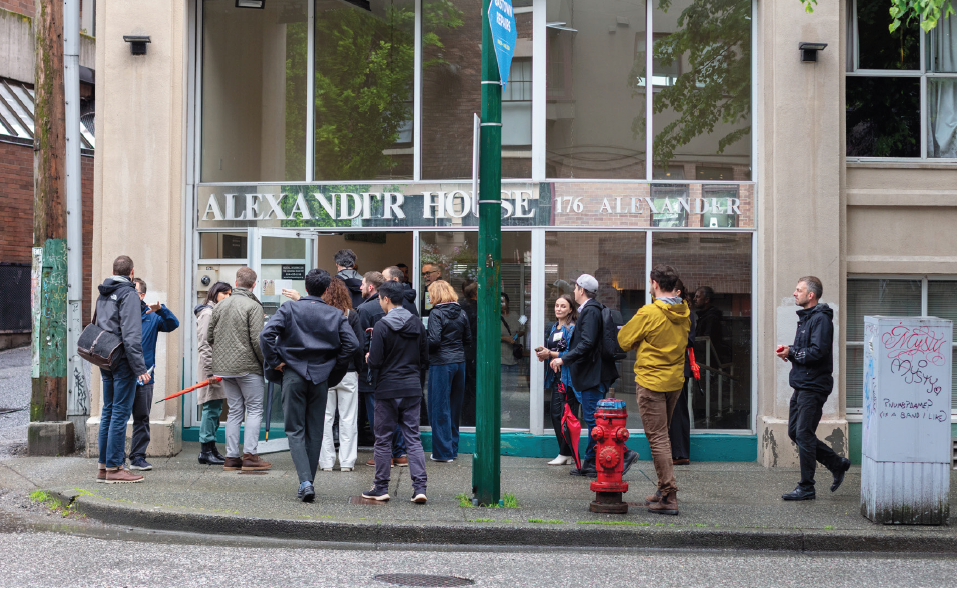Opportunities & Challenges of Retrofits

Learnings from Low Income Seniors Residence Alexander House- Net Zero Imperative
The ULI Technical Advisory Panel (TAP) convened in May 2024 to develop strategies for scaling up retrofits in Vancouver, British Columbia, focusing on affordable housing as a pathway to achieving net-zero targets. Alexander House, an 81-unit seniors' residence, served as the case study for addressing the challenges and opportunities of building retrofits.
Buildings in Metro Vancouver account for 25% of greenhouse gas (GHG) emissions in the area. 80% of the buildings that will exist in 2050 are already built, and to meet Canada's 2050 net zero emission goals, 600,000 homes must be retrofitted each year. While retrofits can enhance energy efficiency and tenant comfort, barriers such as high costs, complex permitting, and limited organizational capacity persist. The TAP sought to develop a roadmap to overcome these challenges and scale retrofit adoption.
Despite advancements in building systems, technology, and energy modeling, key obstacles remain. Many funding and regulatory structures are not aligned with retrofit needs; therefore, the TAP has generated recommendations for stakeholders to implement.
The TAP findings highlight the transformative potential for retrofits,
specifically affordable housing, to reduce emissions and improve tenant
well-being. By addressing these barriers and fostering collaboration,
Vancouver can accelerate retrofit adoption to achieve climate and
housing goals while creating resilient, low-carbon communities.
Related:
- City of Melboure Net Zero Imperative
- ULI East China Net Zero Imperative
- ULI China Mainland Net Zero Imperative
ULI Vancouver TAP Panelists
- Chris Kasianchuk, Warrington PCI Management
- Michael Driedger, MCW Consultants
- Christian Cianfrone, OPEN Technologies
- Patrick Roppel, EVOKE Buildings
- Nick Bray, Principal, Nick Bray Architecture
- Esteban Matheus, DIALOG
- Troy Glasner, White Blue Green
- Stephan Baeuml, ZEIC/ZEBX
- Atoine Archie, AHMA
- Andre O’Neil, DIALOG
- Pako Hung, Ledcor
- Morgan McDonald, Ledcor
- Brennan Anstey, Pinchin
- Laurence Kao, Pinchin
- Jade Hume, Metro Vancouver
ULI Vancouver TAP Advisors:
- Patrick Caraher, Aboriginal Housing Management Association
- Atoine Archie, Aboriginal Housing Management Association
- William Azaroff, Brightside Community Homes Foundation
- Luke Harrison, Catalyst
- Donovan Woollard, Open Technologies
- Christian Cian frone, Open Technologies
- Betsy Agar, Pembina Institute
- Victoria Richards, BC Hydro
- Micah Lang, City of Vancouver
- Patrick Roppel, Evoke Buildings
Panel Support
- Ayden Kristmanson
Report Summary: The ULI Technical Advisory Panel (TAP) convened in May 2024 to develop strategies for scaling up retrofits in Vancouver, British Columbia, focusing on affordable housing as a pathway to achieving net-zero targets. Alexander House, an 81-unit seniors' residence, served as the case study for addressing the challenges and opportunities of building retrofits.
Buildings in Metro Vancouver account for 25% of greenhouse gas (GHG) emissions in the area. 80% of the buildings that will exist in 2050 are already built, and to meet Canada's 2050 net zero emission goals, 600,000 homes must be retrofitted each year. While retrofits can enhance energy efficiency and tenant comfort, barriers such as high costs, complex permitting, and limited organizational capacity persist. The TAP sought to develop a roadmap to overcome these challenges and scale retrofit adoption.
Despite advancements in building systems, technology, and energy modeling, key obstacles remain. Many funding and regulatory structures are not aligned with retrofit needs; therefore, the TAP has generated recommendations for stakeholders to implement.
The TAP findings highlight the transformative potential for retrofits,
specifically affordable housing, to reduce emissions and improve tenant
well-being. By addressing these barriers and fostering collaboration,
Vancouver can accelerate retrofit adoption to achieve climate and
housing goals while creating resilient, low-carbon communities.
Related:
- City of Melboure Net Zero Imperative
- ULI East China Net Zero Imperative
- ULI China Mainland Net Zero Imperative
ULI Vancouver TAP Panelists
- Chris Kasianchuk, Warrington PCI Management
- Michael Driedger, MCW Consultants
- Christian Cianfrone, OPEN Technologies
- Patrick Roppel, EVOKE Buildings
- Nick Bray, Principal, Nick Bray Architecture
- Esteban Matheus, DIALOG
- Troy Glasner, White Blue Green
- Stephan Baeuml, ZEIC/ZEBX
- Atoine Archie, AHMA
- Andre O’Neil, DIALOG
- Pako Hung, Ledcor
- Morgan McDonald, Ledcor
- Brennan Anstey, Pinchin
- Laurence Kao, Pinchin
- Jade Hume, Metro Vancouver
ULI Vancouver TAP Advisors:
- Patrick Caraher, Aboriginal Housing Management Association
- Atoine Archie, Aboriginal Housing Management Association
- William Azaroff, Brightside Community Homes Foundation
- Luke Harrison, Catalyst
- Donovan Woollard, Open Technologies
- Christian Cian frone, Open Technologies
- Betsy Agar, Pembina Institute
- Victoria Richards, BC Hydro
- Micah Lang, City of Vancouver
- Patrick Roppel, Evoke Buildings
Panel Support
- Ayden Kristmanson


